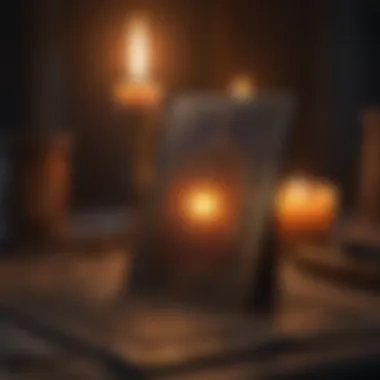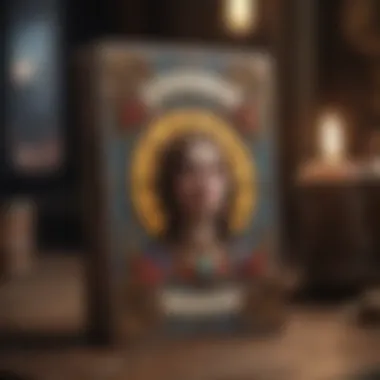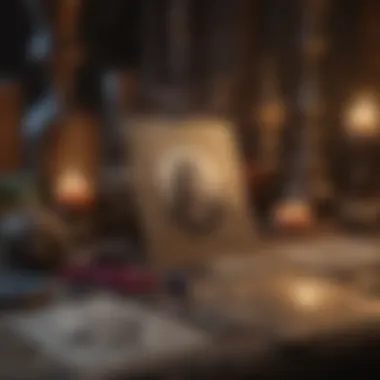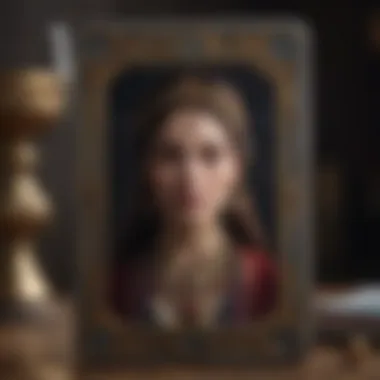Crafting Insightful Tarot Questions for Clarity


Intro
Formulating effective tarot questions can profoundly influence the quality of any tarot reading. Whether you seek insight into personal growth, relationships, careers, or spiritual development, the way you structure your questions plays a crucial role. This article will guide readers to create questions that elicit deeper and more meaningful responses from tarot cards. By categorizing inquiries into different themes, readers can learn how to approach their tarot sessions with both intention and clarity.
Characteristics of Each Zodiac Sign
Understanding the characteristics of each zodiac sign can enhance one’s tarot readings. Each sign carries its own unique traits that provide context to the questions asked during tarot sessions. Below are essential points to consider:
- Overview of personality traits: Each zodiac sign embodies different emotional and psychological attributes. For example, Aries is known for its leadership and dynamic energy, while Cancer may display sensitivity and nurturing qualities.
- Strengths and weaknesses: Knowing the strengths and weaknesses of each sign can guide your questions. A Sagittarius’s adventurous spirit can lead to questions about exploration, while a Taurus's stubbornness may prompt inquiries about flexibility and adaptation.
- Compatibility with other signs: Compatibility influences various aspects of life. Understanding zodiac interactions can inform relationship-related questions. By knowing how signs relate, better questions can emerge, such as inquiries about harmony or conflict in personal dynamics.
How to Interpret Tarot Cards
Interpreting tarot cards effectively requires knowledge of both the major and minor arcana. Here are the key components to understand:
- Major and Minor Arcana: The major arcana represents significant life events, whereas the minor arcana reflects daily influences. Both layers provide insight that aids in framing questions.
- Meaning of key cards: Each card holds distinct symbolism. For instance, The Fool signifies new beginnings, thus inspiring questions about opportunities and risks in one’s life.
- Sample interpretations in different spreads: The layout of the cards also matters. A three-card spread focused on past, present, and future can contrast with a Celtic cross that reveals broader life themes. Tailoring questions to the spread can enhance insight.
- Overview of deck styles: Various tarot decks, like the Rider-Waite or the Thoth Tarot, provide different imagery and meanings. Understanding these can refine how questions are posed based on the chosen deck.
- Popular decks and their unique features: Certain decks have distinct focuses. For instance, Oracle decks often emphasize intuitive guidance, while traditional tarot decks may stick to archetypal representations.
The End
Crafting precise tarot questions is essential for meaningful readings. By integrating knowledge from zodiac signs and understanding tarot card interpretations, one can maximize the potential of tarot as a tool for guidance. This exploration serves both novices and seasoned practitioners, reinforcing how well-structured inquiries can open pathways to insight. As we expand our understanding of these connections, our tarot practices will evolve, offering richer experiences.
Understanding Tarot Questions
Understanding tarot questions is fundamental to getting valuable insights from tarot readings. The way a question is posed significantly influences the nature of the guidance received. Effective questions invite clarity and depth, while poorly constructed ones may lead to confusion or unhelpful answers.
The Importance of Effective Questions
Effective questions serve as the foundation of a meaningful tarot consultation. They focus the reading and help both the reader and querent to hone in on the core issue at hand. When clarity in questioning is achieved, the tarot cards can respond with precision, providing insights that are not only relevant but transformative.
Consider these key aspects of why effective questions matter:
- Direct Focus: Well-formulated questions direct the tarot reading toward specific concerns or ambitions. This focus allows the reader to extract relevant meanings from each card drawn.
- Deeper Insights: Questions that invite elaboration can unveil layers of understanding. Instead of seeking surface-level answers, nuanced inquiries encourage exploration of the subject at a deeper emotional or spiritual level.
- Empowerment: Crafting thoughtful questions empowers individuals to take ownership of their situations. This enhances their ability to engage with the guidance provided, thereby making them more accountable for their decisions.
"The quality of the tarot reading is often dictated by the questions asked."
Types of Tarot Questions
There are various types of tarot questions, and understanding these categories aids in formulating effective inquiries. The nature of the question can lead to significantly different readings. Here are a few distinguishing types:
- Open-Ended Questions: These questions allow for expansive responses, inviting the cards to provide richer insights. For example, asking "What do I need to know about my career path?" opens the floor for various interpretations.
- Specific Questions: Narrowly focused inquiries yield more straightforward answers. Such questions could include, "What can I do to improve my relationship with my partner?"
- Timing Questions: Questions about timing can help discern when to expect developments to unfold. An example might be, "When can I expect to see progress in my personal projects?"
- Reflective Questions: Inquiries that prompt reflection often lead to deeper personal growth. For instance, asking "What patterns do I need to break in my life?" encourages introspection and self-analysis.
Utilizing different types of questions can enrich the tarot experience, offering diverse avenues for exploration. By consciously selecting the type of question, practitioners enhance their readings and contribute to a more comprehensive understanding of their inquiries.
Formulating Personal Growth Questions
Formulating personal growth questions is a vital aspect of effective tarot reading. These inquiries guide the reader towards deeper self-awareness and understanding. By focusing on areas of self-improvement, individuals can harness the full potential of the tarot as a tool for reflection and insight.
When crafting personal growth questions, consider what areas in your life feel stagnant or need exploration. These may relate to emotional health, relationships, or ambitions. The aim is to encourage introspection rather than to seek definitive answers. Good questions can illuminate underlying issues and foster meaningful dialogue within oneself.
Exploring Self-Discovery
The journey of self-discovery is nuanced and often complex. It involves unearthing hidden emotions, thoughts, and desires. Tarot serves as a mirror, reflecting aspects of ourselves we may neglect. By asking specific questions, individuals can gain clarity on their identity and values.
Examples of effective self-discovery questions:
- What fears are holding me back from my true self?
- How do I perceive my strengths and weaknesses?
- In what areas of my life do I feel most authentic?
These questions aim to evoke deeper contemplation. A reader should take time after the reading to ponder these insights. Self-discovery is not about immediate answers but rather about the evolution of understanding over time.
Identifying Blockages
Identifying blockages is crucial in personal growth, as obstacles can hinder progress. Tarot questions can reveal what these blockages are, whether they are emotional, mental, or behavioral. Recognizing these barriers allows one to address them effectively.
Common questions include:
- What negative patterns do I need to break?
- Are there limiting beliefs restricting my potential?
- How can I overcome the challenges I face?
By framing questions this way, the tarot reading can highlight specific areas that require attention. Such questions not only lead to insight but can also spur action toward overcoming these blockages.
Setting Goals
Setting goals is a vital part of personal growth that provides direction and motivation. Questions centered on goals help in crystallizing aspirations and mapping out steps to achieve them. Goals should be SMART: Specific, Measurable, Achievable, Relevant, and Time-bound.


Consider these questions when setting goals:
- What do I truly want to achieve in the next year?
- How can I align my goals with my values?
- What steps can I take to turn my dreams into reality?
By using tarot for goal setting, one can obtain insight into the feasibility of aspirations and the paths to realization. Understanding the broader context of one’s goals through tarot can inspire a well-rounded plan for personal development.
Crafting Relationship Questions
Crafting relationship questions is essential when engaging with tarot as it provides much-needed clarity on interpersonal dynamics. Relationships are complex, often involving multiple emotions and perspectives. By formulating targeted questions, one can unveil insights that encourage growth, understanding, and even healing. These inquiries also help in identifying underlying issues that may not be immediately apparent, thus fostering deeper connections.
Effective relationship questions can bring to light the thoughts and feelings of all parties involved. They should aim for specificity, focusing on particular concerns or themes that need exploration. This approach is beneficial as it directs the reading towards meaningful insight rather than vague or unnecessary information. Relationship questions can address any number of issues, from romantic entanglements to familial ties to friendships.
Understanding Dynamics
Understanding the dynamics within a relationship is crucial for any tarot reading focused on interpersonal matters. Questions that delve into the fundamental principles of a relationship can reveal the emotional landscape that defines it. Inquiring about the strengths of the relationship, as well as areas that may require attention, can provide balanced insights.
For instance, a question like "What does my partner need from me?" seeks to uncover hidden needs and expectations. This type of question allows for a deeper understanding of each other's perspectives, potentially leading to significant advancements in relationship quality. Focusing on dynamics also aids in recognizing patterns that may repeat and hinder growth, which can be transformed through conscious effort.
Navigating Conflicts
Conflicts are natural in any relationship, and tarot can be a powerful tool for navigating these turbulent waters. When formulating questions that address existing tensions, it is important to approach them with a desire for resolution.
Asking something like "What do I need to learn from our current conflict?" invites reflection on personal growth rather than assigning blame. This perspective encourages individuals to look beyond immediate frustrations and consider the lessons that conflicts can offer. It instills a sense of accountability and encourages productive dialogue, rather than just remaining emotions.
By comprehending the origins and functions of a conflict, one can better approach resolution strategies. In this way, tarot becomes not just a source of insight, but a medium for healing.
Enhancing Communication
Effective communication is the backbone of any successful relationship. Crafting questions focused on improving communication channels can elevate the quality of interactions significantly. Questions such as "How can I express my feelings more clearly?" can help identify barriers to open dialogue.
The act of formulating these questions itself is a step toward fostering better communication. By bringing awareness to how we engage with others, it creates space for reflection and growth. Questions not only serve as prompts during a tarot reading but also act as conversations starters that can be used in real-life discussions.
Enhancing communication through focused questions leads to enriched relationships, enabling partners to meet each other's needs more effectively.
Crafting targeted relationship questions enhances the depth and quality of tarot readings, allowing for clearer insights and paths to resolution.
Inquiring About Career Paths
Inquiring about career paths through tarot can be a pivotal part of one’s journey. Careers play a significant role not only in our financial stability but also in our sense of identity and fulfillment. Tarot readings can serve as a profound tool to uncover deeper motivations, challenges, and opportunities related to one's professional life. The right questions can illuminate paths that may have been overlooked or inspire shifts in perspective. By focusing on the nuances of career inquiries, individuals can find clarity amid uncertainty and gain insights that lead to better decision-making.
Aligning with Your Purpose
To align with your purpose, it is essential to ask questions that reveal your true desires and strengths. One effective way to do this is by formulating questions such as:
- What brings me joy in my work?
- How can my skills benefit others?
- What is the next step on my career path?
These inquiries encourage reflection on personal values and passions. The alignment of career with purpose often leads to greater satisfaction and motivation. It is a way of discovering not just what you want to do, but who you are meant to be in your professional life. Tarot can unveil insights that remind us of our intrinsic motivations and guide us toward more fulfilling choices.
Overcoming Professional Challenges
When faced with difficulties in the workplace, tarot can provide clarity. Formulating questions such as:
- What is hindering my professional growth?
- How do I handle conflicts at work?
- What is the lesson behind this challenge?
These types of questions help in understanding obstacles more profoundly. Tarot readings can highlight patterns and suggest new approaches, empowering individuals to take actionable steps. Furthermore, they can reveal underlying issues that you might not see due to stress or emotional turmoil. With the guidance of tarot, navigating the complexities of work becomes more manageable and less daunting.
Exploring New Opportunities
Finding new opportunities in one's career is vital for growth. Tarot can play a critical role in identifying paths to explore. Ask:
- What potential opportunities should I consider?
- How can I expand my network?
- What risks are worth taking at this time?
These inquiries foster a mindset open to possibilities. Tarot can suggest avenues you may not have considered. Whether it’s a new job, further education, or simply a side project, the insights gained from tarot can spur ideas that cultivate innovation and advancement in your career. By embracing new opportunities, individuals not only enhance their skill sets but also broaden their horizons in their professional lives.
"The questions you ask in tarot reveal your deepest needs and strengths, guiding you along your professional journey."
By incorporating a reflective approach to career paths, tarot questions can transform the way we view our professional lives, offering insights that promote alignment, problem-solving, and exploration.
Spiritual Development Questions
Spiritual development questions play a critical role in tarot readings. This section helps individuals explore the deeper aspects of their inner selves, guiding them towards spiritual growth and understanding. By focusing on spirituality, practitioners can align their tarot sessions with their higher self and purpose. These questions often lead to insights that can transform one's journey.
When forming spiritual development questions, one should consider the intention behind them. Effective inquiries can shed light on life's bigger questions, uncover hidden patterns, and even prompt a sense of connection with the universal energy. The benefits of such inquiries include improved self-awareness, heightened intuition, and a better sense of one's life purpose.


Here are some key elements to consider when crafting spiritual development questions:
- Clarity of Intent: Clearly defined questions yield better insights.
- Openness: Being ready to accept any guidance is crucial.
- Reflection: Questions should encourage deep introspection.
Seeking Inner Peace
Questions aimed at seeking inner peace can be transformative. Many people face daily challenges that disrupt their sense of tranquility. By using tarot to explore these disturbances, individuals can gain clarity on the sources of their stress. Effective questions on this topic might include:
- "What can I do to cultivate more peace in my life?"
- "What internal conflicts are preventing my peace?"
These inquiries lead to cards that can reveal not just external influences but also internal states that need attention. By addressing these insights, one can embark on a path to inner calm.
Understanding Spiritual Paths
Every individual has a unique spiritual journey. Understanding spiritual paths through tarot can illuminate the choices available to a seeker. When forming questions in this area, one might ask:
- "What steps can I take to align with my current path?"
- "What lessons must I learn before progressing?
Such questions encourage a exploration of life's complexities as well as the opportunities for growth. Additionally, tarot cards can offer clues on how to navigate through obstacles presented on these paths, guiding individuals in their decisions.
Connecting with Intuition
Cultivating intuition is vital for anyone engaged in spiritual development. Questions that focus on enhancing one's intuitive voice can lead to profound realizations. For example:
- "How can I strengthen my intuitive abilities?"
- "What signs should I be aware of that guide my intuition?"
Connecting with intuition involves understanding personal signals and messages from the universe. Tarot can facilitate this connection, revealing hidden truths that one may not readily perceive. This can lead to clearer insights and decisions aligned with one's spiritual nature.
In summary, spiritual development questions are essential in tarot practice. They foster self-discovery and guide individuals on their spiritual journey, revealing paths to inner peace, understanding, and intuitive connections. Thus, taking time to understand these questions can yield powerful insights.
Tailoring Questions for Specific Tarot Spreads
When engaging with tarot, the way questions are framed can significantly affect the insights gained during a reading. Each tarot spread offers a unique lens through which to examine complex situations, feelings, and futures. Tailoring questions to specific tarot spreads is essential as it enhances clarity and intention. Using appropriate spreads helps to illuminate the issues at hand, guiding the reader toward more meaningful interpretations. Here, we dissect how to frame questions for three prominent types of tarot spreads: single card draws, three-card spreads, and the Celtic Cross spread.
Single Card Draws
Single card draws offer a simplified yet profound approach to tarot reading. In this context, it is vital to formulate questions that are precise and focused. Asking a straightforward question allows for a direct answer from the card drawn. For example, a query like "What should I focus on today?" invites a clear response regarding daily priorities. This method is beneficial for quick insights and provides guidance when time is limited or uncertainty abounds. It allows one to engage meaningfully with the tarot while avoiding potential overwhelm with more complex inquiries.
Key Considerations for Single Card Draws:
- Clarity: Ensure the question is specific and unambiguous.
- Focus: Center on immediate concerns or guidance, rather than broad topics.
Three-Card Spreads
Three-card spreads are known for their versatility, offering a snapshot of past, present, and future influences. To effectively utilize this spread, it’s important to tailor your questions to explore relationships between these timeframes. For instance, asking "What past experiences affect my current situation and what future steps can I take?" creates a dynamic exploration of how time interacts within your life narrative. Each position should prompt a reflective inquiry, guiding you toward deeper understanding and actionable insights. The three-card spread can particularly shine in personal growth and relational dynamics.
Effective Questions for Three-Card Spreads:
- What past actions have shaped my current choices?
- How are my present decisions impacting future outcomes?
- What lessons can I learn from my past to improve my future?
Celtic Cross Spread
The Celtic Cross is one of the most comprehensive tarot spreads. It provides a detailed overview, covering various aspects of a situation. Crafting questions for this spread requires an understanding of its layout and aims. A complex issue can be examined through multiple angles. For example, asking, "What influences surround me, and what obstacles must I overcome?" can yield insightful layers regarding influences, challenges, and hopes.
When developing questions for the Celtic Cross, consider including broader themes that encourage exploration. This could encompass inquiries about your emotional state, external factors, and outcomes.
Sample Questions for the Celtic Cross Spread:
- What challenges block my progress, and how can I navigate them?
- What external circumstances impact my personal journey?
- What does my future hold regarding my current goals?
By tailoring questions specifically to the type of tarot spread in use, readers can engage in a profound investigation of their life’s complexities. Each spread offers distinct advantages, and aligning questions accordingly can optimize the efficacy of tarot readings.
Tips for Preparing for a Tarot Session
Preparing for a tarot session is key to maximizing insights from the cards. A focused approach ensures that both the reader and the seeker are aligned with the intentions set for the reading. It also lays the groundwork for a meaningful connection with the tarot.
When individuals take time to thoughtfully prepare, they enhance clarity and depth in their readings. Effective preparation can mitigate distractions, allowing for a more profound interaction with the cards. It also encourages a mindset receptive to the insights offered through tarot, fostering an atmosphere conducive to spiritual exploration and growth.
Setting Intentions
Setting intentions is one of the most significant steps before beginning a tarot reading. Intention shapes the nature of the reading, guiding the energy of the session toward specific outcomes. By articulating clearly what you hope to understand or uncover, you create a focused lens through which the cards can be viewed.
For instance, instead of asking vague questions like "What should I know?" a more precise intention such as "What actions can I take to improve my relationship with my friend?" yields clearer insights. This practice also helps in narrowing down the questions to ask the cards, eliminating confusion and ambiguity.


Creating a Sacred Space
Creating a sacred space is another crucial aspect of preparing for a tarot session. This involves selecting an environment that feels safe, tranquil, and free from distractions. A dedicated space not only serves as a physical setting but also as a symbolic sanctuary for reflection and insight.
To create such a space, consider dimming the lights, lighting candles, or using incense. Surround yourself with meaningful objects, perhaps crystals or photos, that resonate with your spiritual practice. The aim is to craft an atmosphere that fosters concentration and encourages the flow of intuitive energy.
Grounding Techniques
Grounding techniques are essential for staying connected and focused during a tarot session. These practices allow individuals to center themselves, creating a stable connection with their body and the present moment.
Simple techniques include deep breathing or visualizing roots extending from the feet into the ground. Another effective method is to practice mindfulness, paying attention to the sensations within the body. Such techniques can help reduce anxiety and promote a calm state of mind, ensuring that the reader remains open to the messages the cards offer.
"Grounding techniques anchor us, allowing the spiritual messages revealed in the tarot to be received with clarity."
In summary, preparing for a tarot session through setting intentions, creating a sacred space, and grounding oneself are vital practices. They enhance the overall experience, enabling a deeper connection with the tarot and the insights that emerge.
Interpreting Tarot Responses
Interpreting tarot responses is a fundamental part of the tarot reading process. Once the cards are drawn, it becomes essential to analyze their meanings and connections. This phase not only unveils insights about the questions posed but also enriches the experience of the reader and the querent. A well-interpreted spread can lead to significant personal revelations. To effectively interpret tarot responses, a reader must possess an understanding of each card's individual meaning and how they relate to one another within the spread.
This stage requires not only knowledge of tarot card imagery and symbolism but also intuition and contextual awareness. Each reading is unique, as it can reflect the individual’s specific situation. By leaning into these nuances, a reader can provide guidance tailored to a person's journey. Consideration of card positions, their upright or reversed nature, and relationship with surrounding cards speaks volumes in this interpretation.
"In the realm of tarot, understanding each card is only half of the journey; interpreting how they interact is where true insight lies."
Understanding Card Meanings
To interpret tarot responses effectively, the comprehension of individual card meanings is imperative. Each card holds a specific interpretation linked to various themes and emotions. For instance, the Fool signifies new beginnings and opportunities, while the Death card represents transformation and change. Familiarity with these meanings can guide a reader in delivering accurate insights.
When interpreting cards, it’s crucial to be aware of both the upright and reversed positions. An upright card often conveys its usual message, whereas a reversed card can indicate an opposite meaning or internal conflict. Keeping a reference or a guide can assist in recalling card meanings smoothly during a reading.
- Major Arcana cards typically address significant life events and spiritual lessons.
- Minor Arcana cards relate to everyday issues and personal experiences.
- Court Cards often depict people or personality traits relevant to the query.
The nuances in meanings can provide layers of understanding that deepen the reading experience.
Combining Cards for Insight
The power of tarot is amplified when combining cards in a spread. Understanding how cards interact with one another can provide a multidimensional perspective on the querent’s situation. Each card in a spread carries weight, and together, they create a narrative that reveals hidden aspects of the question.
For example, if a Three of Swords appears alongside The Lovers, it can indicate a painful choice or conflict in a relationship. The dialogue between cards can bring forth crucial insights that would remain obscured if considered in isolation.
Consider these strategies when interpreting combined card meanings:
- Look for repeating themes or elements related to the question posed.
- Analyze the positions of the cards within the spread for context.
- Reflect on the emotional resonance of the cards together.
Utilizing the synergy of multiple cards elevates the reading's depth. Each combination offers unique insights and helps unravel complex situations in the querent's life.
Common Mistakes in Tarot Questioning
Understanding common mistakes made in tarot questioning is essential for anyone looking to improve their tarot practice. The way questions are formulated can significantly influence the quality of insights gained from tarot readings. Mistakes can lead to confusion, unsatisfactory responses, and ultimately an unproductive experience. By focusing on these frequent pitfalls, readers can refine their approach, ensuring that their inquiries elicit meaningful guidance.
Asking Closed Questions
Closed questions are inquiries that limit responses to 'yes' or 'no.' For instance, asking "Will I get the job?" closes off the potential for deeper exploration. These types of questions restrict the dynamic nature of a tarot reading, leading to shallow responses. Instead, framing open-ended questions allows the tarot cards to provide a more nuanced narrative. An example modification would be to ask, "What can I do to increase my chances of getting the job?" This invites a more comprehensive analysis.
Using open questions not only encourages the tarot cards to tell a story but also empowers the querent to engage with the insights on a more personal level. This enriches the reading experience, fostering self-reflection and deeper understanding. In short, avoid closed questions when seeking meaningful tarot responses.
Vague or General Questions
Vague or general questions can dilute the potency of a tarot reading. Questions like, "What is my future?" lack specificity and can lead to diffused insights. Tarot responds best to clear, focused inquiries. When questions are too broad, the interpretation becomes challenging and can veer off course. It may end up touching on points that are not relevant to the querent's true concerns.
To enhance clarity and precision, a better approach would be asking something like, "What do I need to know about my career prospects in the next six months?" This specificity guides the reading, directing the cards to provide targeted advice. It’s essential to reflect on what specific area of life you want insight into before formulating your question. By doing so, the tarot reading becomes a more precise tool for understanding one's path.
Understanding and avoiding these common mistakes will lead to more fruitful tarot sessions. Errors in the questioning process can undermine the depth and quality of insights received, and addressing these issues adds significant value to the practice.
Ending and Final Thoughts
In summary, the exploration of effective tarot questions holds significant weight in enhancing the quality of tarot readings. This article has delved into different segments of inquiry, providing frameworks that allow for deeper introspection and clarity in various aspects of life including personal growth, relationships, and spiritual development. Crafting precise and intentional questions is not merely a formality; it shapes the entire reading process.
Recap of Key Points
- Importance of Effective Questions: Well-formulated questions guide the tarot reader toward specific insights, preventing vagueness and ambiguity in responses.
- Types of Questions: Understanding different categories such as personal growth, career, and relationships aids in addressing the unique concerns of each client.
- Common Mistakes: Recognizing pitfalls like asking closed or overly general questions helps practitioners refine their questioning technique.
- Preparation and Intentions: Setting clear intentions and preparing an appropriate environment establishes a conducive atmosphere for meaningful tarot sessions.
Incorporating these elements ensures that both novice and experienced tarot readers can maximize the insight obtained from their readings.
Encouragement to Experiment
There is no singular way to engage with tarot. Practitioners are encouraged to experiment and adapt their questions to fit changing circumstances and personal growth themes. This adaptability can lead to surprising insights and enriched experiences in the reading process.
The journey of tarot is one of exploration. Don’t hesitate to deviate from the norms or try out unconventional questions that surface from your intuition. Each card drawn can speak to different aspects depending on how they are approached. Embrace the learning curve as you refine your abilities.







